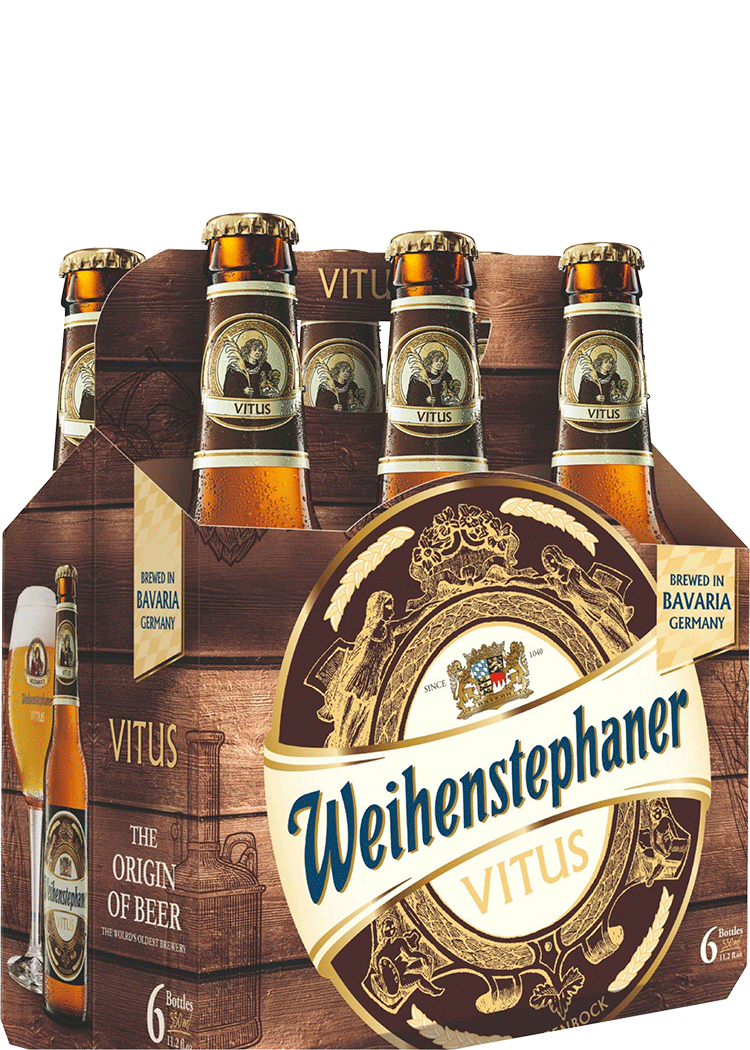tap to enlarge
Weihenstephaner Vitus
6pk-11oz Btls
$14.99
*Price, vintage and availability may vary by store.
*Price, vintage and availability may vary by store.
Product Highlights
Germany- Weizenbock- 7.7% ABV. The Golden Child of the Weihenstephaner Brewery. Aromas of dried apricots and citrus. This fulL- bodied high ABV has notes of banana and an effervescent mouthfeel. Its flavor profile is more like a noble, fruity wheat beer.
MaltyWheatSpicy
Product Details
OVERVIEW
Subtype / Style
Also known as “Weissbock,” this German wheat beer (Weizen bier/Weissbier) is brewed with Bavarian Wheat or Hefeweizen ale yeast, yet it’s stronger in alcohol and flavor character than a standard Hefeweizen or Dunkelweizen and exhibits abundant malt sweetness balanced by clove spiciness and fruity-banana esters. Translated as “wheat-strong,” Weizenbock shouldn’t be confused with Bock, the German strong lager. Weizenbock can be pale or dark in color, with darker versions often exhibiting dark malt character, including caramel, chocolate or roasty notes.
Producer Story
Beer has been brewed on site of Germany’s Bayerische Staatsbrauerei Weihenstephan (the Bavarian State Brewery at Weihenstephan) for approximately 1,000 years, so Weihenstephan has a good claim on being the oldest brewery in the world. It began as a monastery brewery, duly recorded when the abbot received a license from the city of Freising to brew and sell beer in 1040. It was the beginning of a long brewing legacy amid challenges that spanned centuries.
Between 1085 and 1463, the Weihenstephan monastery burned down completely four times and was destroyed or depopulated by three plagues, various famines and an earthquake. Each time, the monks rebuilt the monastery and brewery and continued to refine their brewing art. What these natural disasters could not take away, the state of Bavaria did in 1803 when, in a wave of secularization, it dissolved the monastery and repurposed its buildings. The brewery, however, remained, operating under state supervision.
In 1852, Bavaria’s Central Agricultural School and its brewing students moved to Weihenstephan. The school became the University of Agriculture and Brewing in 1919 and then the Bavarian State Brewery at Weihenstephan two years later. By 1930, it was incorporated with the Technical University of Munich and became the center of world brewing technology.
Despite Weihenstephan’s likely status as the world’s oldest brewery, it is also one of the most modern, with a unique combination of tradition and state-of-the-art science contributing to its top-quality brews. Weihenstephaner beers include Weihenstephaner Original (Munich Helles Lager), Korbinian (Doppelbock), Kristall Weissbier, Hefe Weissbier, Hefe Weissbier Dark and Vitus.
Source: Brauerei Weihenstephan
